OCCUPIED JERUSALEM — At a workshop on the edge of the Aqsa
Mosque compound, Muhammad Rowidy spends hours hunched over panes of stained
glass, painstakingly carving through white plaster to reveal geometric designs.
While he works, there is a thought he cannot shake.
اضافة اعلان
“You see this,” he said, pausing and leaning back, “this takes
months to finish, and in one minute, in one kick, all this hard work goes.”
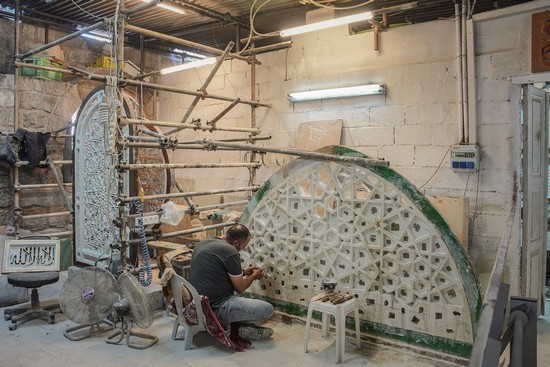 Muhammad Rowidy, a Palestinian
artisan who works to maintain and restore the historic mosques and other
structures in the Aqsa Mosque complex, in occupied Jerusalem.
Muhammad Rowidy, a Palestinian
artisan who works to maintain and restore the historic mosques and other
structures in the Aqsa Mosque complex, in occupied Jerusalem.
Rowidy and dozens of other Palestinian artisans and workers
maintain and restore the historic mosques and other structures in the Aqsa
Mosque complex revered by Muslims as the Noble Sanctuary. It is also known by
Jews as the Temple Mount.
Bracing for more unrestThe Muslim holy month of Ramadan started Wednesday and this year
will overlap with the Jewish holiday of Passover in early April, raising
concerns about the possibility of violence.
The workers at the mosque, the third-holiest site in Islam, need approval from Israeli authorities for repairs or replacements, down to every broken window or smashed tile, according to the workers, administrators of the site and Israeli rights groups.
The artisans there — including a gold-leaf specialist,
coppersmiths, and wood carvers — fear that their meticulous work will be
destroyed, as has happened in years past. Their frustrations have been
intensified by the tighter control that Israel has exerted over the complex in
recent years, making repairs more difficult.
The workers at the mosque, the third-holiest site in Islam, need
approval from Israeli authorities for repairs or replacements, down to every
broken window or smashed tile, according to the workers, administrators of the
site and Israeli rights groups.
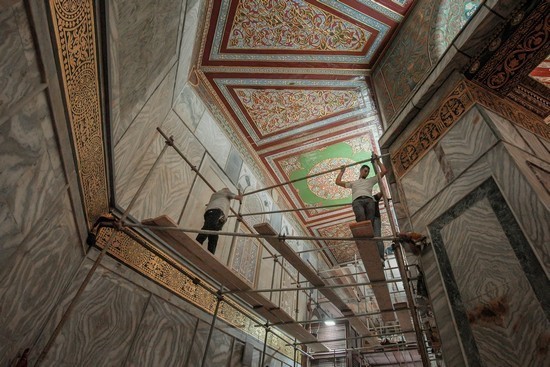 Renovation work inside the Dome of the Rock in
the Aqsa Mosque compound, in occupied Jerusalem.
Renovation work inside the Dome of the Rock in
the Aqsa Mosque compound, in occupied Jerusalem.
Jews believe that the compound is the location of two ancient
temples and consider it the holiest site in Judaism. And in recent years,
Jewish worshippers have prayed inside the compound, a violation of an agreement
that has been in place since 1967.
With the overlapping holidays this year, there are concerns that
increased visits and unauthorized prayers by could provoke further escalations
between Israeli forces and Palestinians, as has been the case in previous
years.
The atmosphere is already tense amid rising violence in the
Israeli-occupied West Bank. It has been the deadliest start of a year for
Palestinians in the territory in more than two decades as settler violence
increases and as Israel steps up lethal raids.
At Al-Aqsa complex, between baton-wielding riot police shooting
tear gas and sponge-tipped bullets and Palestinians responding, a trail of
broken windows and other damage has been left in recent years. After the
violence, Rowidy and his colleagues are left to pick up the pieces.
Broken stained-glass windows line the top of the Qibli Mosque,
one of two main structures inside the Aqsa compound, along with the Dome of the
Rock, a gold-domed prayer hall.
The artisans say it can sometimes take years to secure approvals
for repairs.
Bassam Al-Hallaq, an architect who has worked at Al-Aqsa Mosque
for more than 40 years, overseeing artisans and workers, said that in 2019,
Israeli police detained and handcuffed him for hours after he tried to replace
a tile without approval. He keeps newspaper clippings about his experience
taped to a filing cabinet in his office as a reminder.
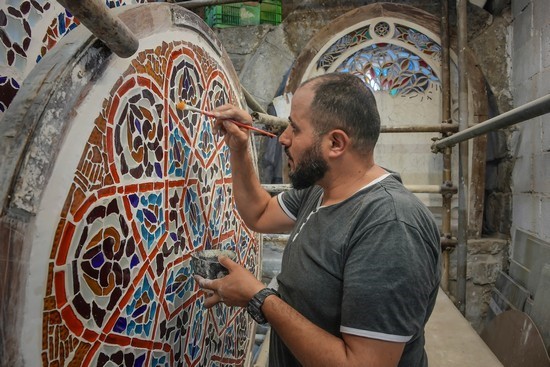 Muhammad Rowidy, a Palestinian artisan who works
to maintain and restore the historic mosques and other structures in the Aqsa
Mosque complex in occupied Jerusalem.
Muhammad Rowidy, a Palestinian artisan who works
to maintain and restore the historic mosques and other structures in the Aqsa
Mosque complex in occupied Jerusalem.
“The occupation wants to assert that it is in control and
nothing happens without their approval,” Hallaq said, referring to Israel’s
occupation of East Jerusalem. “They are not operating according to the
agreement” governing the complex, he added.
It has been the deadliest start of a year for Palestinians in the territory in more than two decades as settler violence increases and as Israel steps up lethal raids.
Israeli forces said that maintenance at the site was “not under
the responsibility” of officers. But, to maintain security and order, police
said, “coordination and escort are required.”
Incidents at the complex have often served as a spark in the
broader Palestinian-Israeli conflict.
In 2000, a trip to the site by Ariel Sharon, who later became
Israel’s prime minister, surrounded by hundreds of police officers, set off the
second intifada, or Palestinian uprising. More recently, the security minister
in Israel’s right-wing government, Itamar Ben-Gvir, angered Palestinians and
regional Muslim states by visiting the compound.
Hallaq said the relationship between the compound’s workers and
police began to fray after Sharon’s visit. But the workers said the situation
had become particularly difficult in the past few years.
The police did not respond to a question about why approval to
fix all the windows at the Qibli Mosque had not been given.
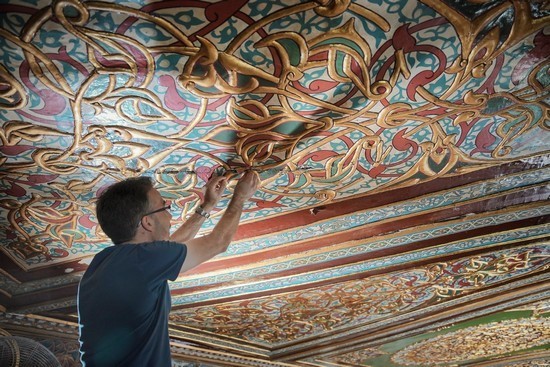 Touching up details inside the Aqsa Mosque
complex, in occupied Jerusalem.
Touching up details inside the Aqsa Mosque
complex, in occupied Jerusalem.
The Jerusalem municipality referred questions to the prime minister’s
office. The prime minister’s office did not respond to the requests for
comment.
The complex’s oversight is handled by an Islamic trust called
the Waqf, controlled and funded by Jordan under an unwritten agreement with
Israel, which has overall security authority and maintains a small police
station inside.
Israel says that there has been no change to the status quo that
has existed at the site since the country captured and annexed East Jerusalem,
including the Old City and the Aqsa compound, in 1967. Much of the world sees
that annexation as illegal and does not recognize Israeli sovereignty over East
Jerusalem.
The police have in the past few years increased their presence
inside the complex, including monitoring the artisans’ work and escorting
Jewish worshippers, said Yitzhak Reiter, president of the nonprofit Middle East
and Islamic Studies Association of Israel who specializes in conflict
resolution in holy places.
During police raids into the complex last year, Israeli forces
barricaded Palestinian worshippers into the Qibli Mosque and padlocked the
doors, damaging handles and wood, according to witnesses and videos.
Officers then climbed onto the roof and broke windows to fire
tear gas and sponge-tipped bullets at those inside. The Palestinians threw
rocks back.
Rowidy, said it was easy to tell which side had broken which
windows. Those completely smashed were done by Israeli police with batons, he
said. A video posted on Facebook during the unrest shows one of the windows
being broken, with what appears to be a baton, from the roof outside.
In comparison, Palestinians who threw stones had knocked large
holes in the windows, he said.
In the workshop, Bassam Ayesh, watched Rowidy working on a
semicircular window from the Qibli. The glass was damaged last year, initially
by Palestinians, before being completely destroyed by Israeli officers, who
used the opening to shoot tear gas and sponge-tipped bullets into the mosque,
Rowidy said.
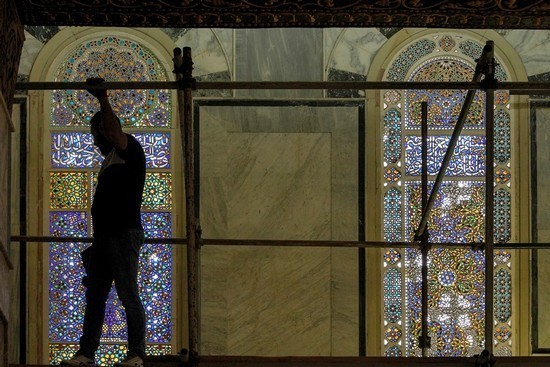 Renovation work inside the Aqsa Mosque compound
in occupied Jerusalem.
Renovation work inside the Aqsa Mosque compound
in occupied Jerusalem.
“As we work on it, we say to each other, ‘How long will this
last? Five minutes?’” said Ayesh, who draws the geometric designs for each
window.
Hallaq, the architect, studied in Greece before returning to
work at the mosque he grew up praying in. Most of the workers learn their trade
inside the compound as older generations pass down knowledge and techniques,
Rowidy said.
After Ramadan last year, the artisans took down the window’s
wooden frame, removed the broken glass and plaster, and began a careful
reconstruction.
First, they set a new sheet of glass and poured plaster on both
sides. Ayesh then drew the geometric design on the plaster in soft charcoal.
Using a small pick, Rowidy slowly moved along the outlines,
removing plaster bit by bit to reveal the glass underneath. In the workshop,
the only sounds were the scratching of pick against plaster, a fan and a
recitation of the Quran playing in the background.
“The occupation wants to assert that it is in control and nothing happens without their approval.”
Outside, in the courtyard next to the Dome of the Rock, some of
their colleagues worked to fix an underground pipe. Two police officers kept
watch.
Nearby, heavily armed police escorted Jewish worshippers around
the compound. Some of them openly prayed.
Taking a break from working on the window, Rowidy entered the
Qibli Mosque and surveyed the broken windows, some dating to the Ottoman
Empire, that he hopes to repair one day.
“When a window like this gets broken, God, my heart gets broken
with it,” he said, pointing at a large pink and blue window. “I’m worried about
the days to come.”





